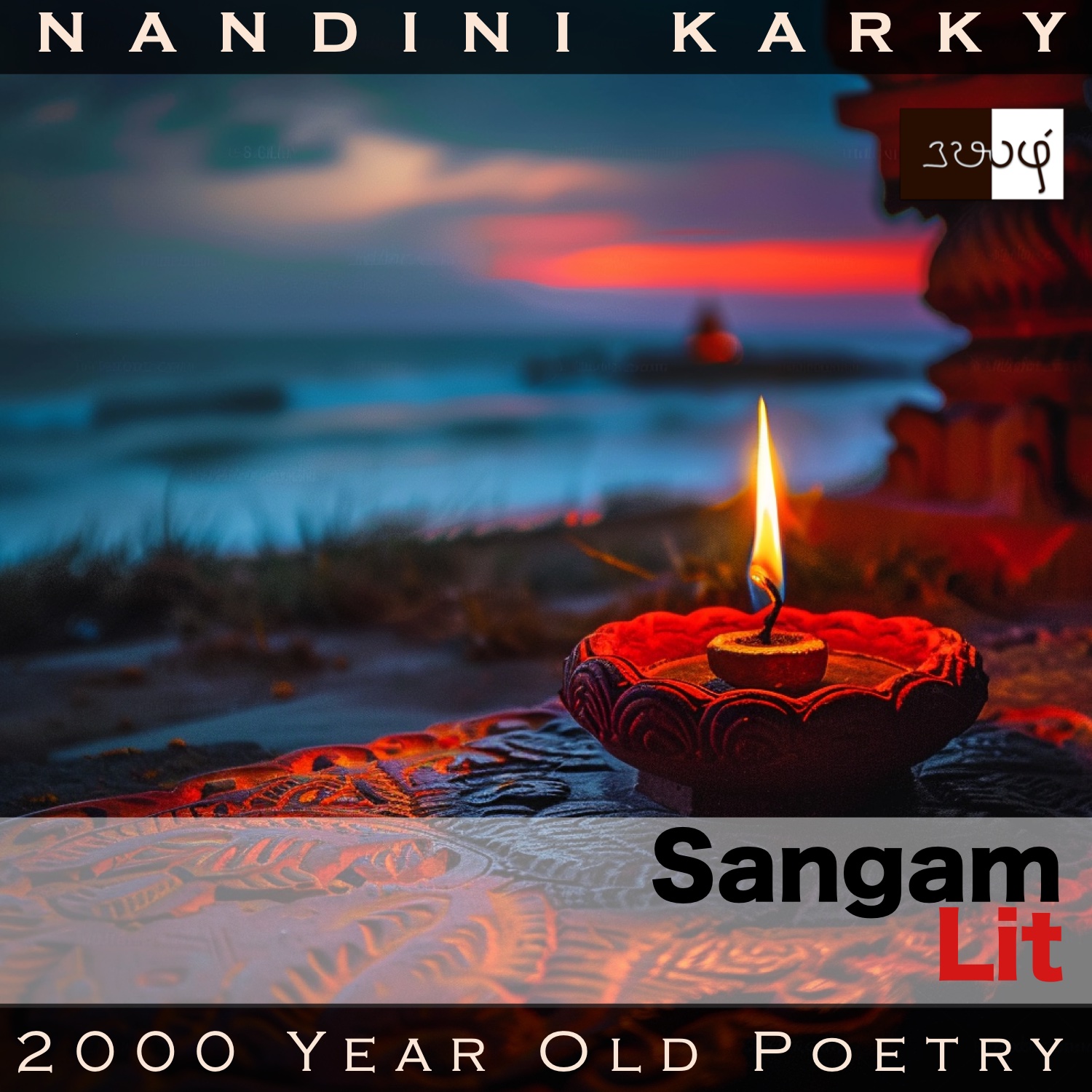Podcast: Play in new window | Download
Subscribe: Apple Podcasts | Spotify | Amazon Music | Android | iHeartRadio | TuneIn | RSS | More
In this episode, we perceive a lady’s pain, as portrayed in Sangam Literary work, Kalithogai 119, penned by Nallanthuvanaar. The verse is situated in the ‘Neythal’ or ‘Coastal Landscape’ and highlights the happenings of an evening.

அகன் ஞாலம் விளக்கும் தன் பல் கதிர் வாயாகப்
பகல் நுங்கியது போலப் படு சுடர் கல் சேர,
இகல் மிகு நேமியான் நிறம் போல இருள் இவர,
நிலவுக் காண்பது போல அணி மதி ஏர்தர,
கண் பாயல் பெற்ற போல் கணைக் கால மலர் கூம்ப,
தம் புகழ் கேட்டார் போல் தலை சாய்த்து மரம் துஞ்ச,
முறுவல் கொள்பவை போல முகை அவிழ்பு புதல் நந்த,
சிறு வெதிர்ங் குழல் போலச் சுரும்பு இமிர்ந்து இம்மென,
பறவை தம் பார்ப்பு உள்ள, கறவை தம் பதிவயின்
கன்று அமர் விருப்பொடு மன்று நிறை புகுதர,
மா வதி சேர, மாலை வாள் கொள,
அந்தி அந்தணர் எதிர்கொள, அயர்ந்து
செந் தீச் செவ்அழல் தொடங்க வந்ததை
வால் இழை மகளிர் உயிர் பொதி அவிழ்க்கும்
காலை ஆவது அறியார்,
மாலை என்மனார் மயங்கியோரே.
A crisp little song after a long time! The words can be translated as follows:
“The sun, which illuminates the wide world with the many rays spelt out from its mouth, then swallows that very day it made and retires to the mountains; Akin to the hue of the war-worthy one with a discus, darkness shrouds; To shed some light and make the world see, the beautiful moon soars in the skies. Akin to eyes that have attained sleep, the thick-stemmed flowers close their buds; Akin to those, who have heard their praise fall on their ears, bending their heads, trees sleep; Akin to spreading smiles, buds bloom lusciously on the bushes; Akin to music from small bamboo flutes, bees resound around; Birds count their young ones; Cows rush towards their hamlets, to attend to their calves with love; Animals return to their lairs; Dusk spreads with light, bearing a sword; Priests welcome the twilight; Red lamps are lit up with red flames; Not realising this is a time that has come to end the lives of maiden wearing radiant jewels, those confused people seem to say it’s just an evening!”
Let’s delve into the details. The verse is situated in the context of a man’s parting from a lady, prior to marriage. These words are rendered by a lady revealing the state of her mind. The lady starts by listing the changes in the outer world unfolding before her eyes. First, she talks about the sun, which was showering rays and lighting up the world all day, now taking up the task of swallowing those very rays and hitting the bed in the mountain. As a consequence, darkness starts spreading and the colour of this darkness is etched with a simile of a dark-skinned god holding a discus in hand, possibly referring to God Thirumaal. Seeing darkness raise its head, the moon decides to do its bit and shows its face in the high skies.
From the skies, the lady then flies to the earth beneath and talks about how flowers are closing their buds like eyes that have found sweet sleep. She also mentions trees bending their heads and resting, in the manner of people who have heard themselves praised. A moment to pause and note this subtle comment about a reaction to appreciation. This highlights how the ancients would exhibit humility when they receive a praise. In the West, in societies where individualism is prized, an appreciation is expected to be met and received with confidence. However, in many eastern cultures, there’s a refusal to accept praise, wherein often the recipient would deflect the same outwardly, saying, ‘Oh, it’s nothing. I cannot accept your praise’ and so on. It’s this subtle difference we can observe in this simile between trees at night and people receiving praise.
Returning, the lady then turns to the flowers blooming like smiles on the bushes and bees buzzing like bamboo flutes around them. She points to birds that have returned to their nests and are checking on their chicks, and cows, rushing homeward to be with their dear calves. That time of twilight seems to her as holding a sword. She then goes to also talk about priests welcoming this time of the day, with verses, and red lamps being lit up. Both are traditions followed till this day in temples and homes in Tamilnadu, a practice to welcome the twilight hour. Now, after listing all the events around here, the lady declares that this is not just a time of the day, this is something that has come to claim the life of maiden, who are parted away from their beloved. She concludes with scorn about people who call this sword-bearing, killing entity as just a harmless ‘evening’. Through these words, we realise the pain of separation that pierces the heart of the lady. At the same time, we have been transported to another time and place to perceive something so well-known to us, the setting of the sun, through the eyes of another!




Share your thoughts...